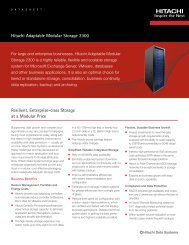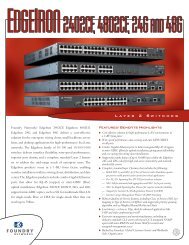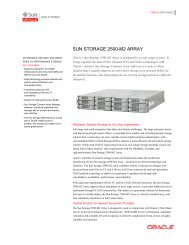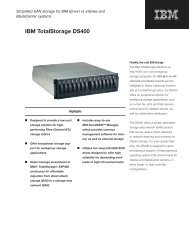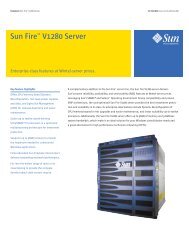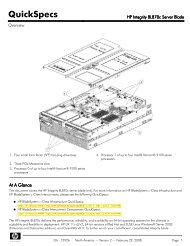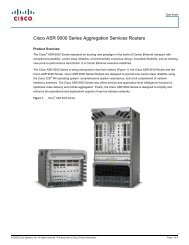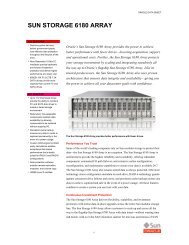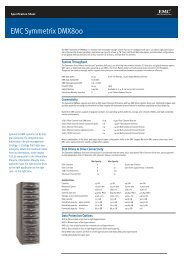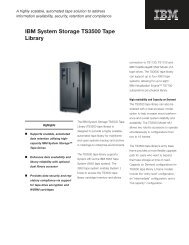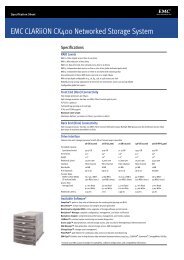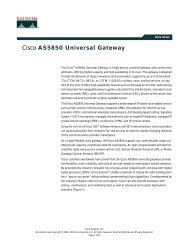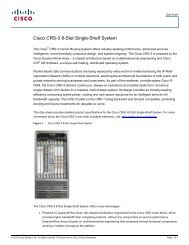IBM z9 Enterprise Class Datasheet - Epoka Group
IBM z9 Enterprise Class Datasheet - Epoka Group
IBM z9 Enterprise Class Datasheet - Epoka Group
You also want an ePaper? Increase the reach of your titles
YUMPU automatically turns print PDFs into web optimized ePapers that Google loves.
The server built to help optimize your resources throughout<br />
the enterprise<br />
<strong>IBM</strong> System <strong>z9</strong> <strong>Enterprise</strong> <strong>Class</strong><br />
Highlights<br />
■ Strengthening the role of the ■ Continued improvement in<br />
mainframe as the data hub of <strong>IBM</strong> FICON® performance and<br />
the enterprise<br />
throughput<br />
■ New versatile capacity settings ■ On demand innovative techdesigned<br />
to optimize capacity nologies to help meet everand<br />
cost<br />
changing business demands<br />
■ <strong>IBM</strong> System <strong>z9</strong> Integrated<br />
Information Processor<br />
(<strong>IBM</strong> zIIP) is designed to<br />
improve resource optimization<br />
and lower the cost of eligible<br />
work<br />
A “classic” might just be the best<br />
Today’s market finds that business<br />
needs are changing, and having a competitive<br />
advantage isn’t always about<br />
having more or being bigger, but more<br />
about being smarter and responding<br />
faster to change and to your clients.<br />
Often, being reactive to change has led<br />
to infrastructures with mixed technologies,<br />
spread across an enterprise, that<br />
are complex and difficult to control and<br />
costly to manage. Integration of applications<br />
and data is limited and difficult.<br />
Using internal information to make<br />
insightful decisions for the company<br />
can be difficult because knowing you<br />
are using the “best” data—that which is<br />
most current and complete—may not<br />
be possible.<br />
In many situations, investments have<br />
been made in disparate technologies<br />
that may fall short of meeting their<br />
goals. Merging information from one<br />
branch to another may not be possible<br />
and so company direction is set with
only a portion of the data at hand, and<br />
in a global economy that can really hurt.<br />
Companies need to be able to regain<br />
control and create a unified infrastructure.<br />
The objective is to find a strategic<br />
platform to standardize on, one that’s<br />
able to integrate and support a large<br />
and diverse set of applications, and one<br />
that has resources that can be shared<br />
and optimized for maximum use. And<br />
of course the goal includes the ability to<br />
scale as the company grows, providing<br />
a safe and security-rich level of<br />
resource protection.<br />
The System <strong>z9</strong> mainframe is perfect to<br />
take on that role. While having classic<br />
strengths on which its reputation was<br />
formed, it continues to be a leader in<br />
areas such as data management, availability,<br />
security and resiliency, virtualization<br />
and integration. Its ability to<br />
support many open and industry standards,<br />
with comprehensive support for<br />
Service-Oriented Architecture, makes it<br />
an ideal platform for deploying new<br />
workloads or for interoperating with<br />
new workloads on alternative<br />
technologies.<br />
The System <strong>z9</strong> <strong>Enterprise</strong> <strong>Class</strong><br />
(<strong>z9</strong> EC), formerly the System <strong>z9</strong> 109<br />
(<strong>z9</strong>-109), provides tight collaboration<br />
with <strong>IBM</strong> storage and <strong>IBM</strong> software to<br />
help achieve advanced I/O function and<br />
performance. And while the <strong>z9</strong> EC can<br />
scale to offer a large capacity mainframe<br />
in a single footprint, some customers<br />
have requested the <strong>z9</strong> EC<br />
innovative features with more flexibility<br />
in customizing and sizing the capacity<br />
of the general purposes processors<br />
(CPs) that reside in the server. These<br />
customers want more options as they<br />
weigh business demands and costs,<br />
trying to achieve the right balance. The<br />
new subcapacity models of the <strong>z9</strong> EC<br />
satisfy these requests. These enhanced<br />
capabilities illustrate that the <strong>z9</strong> EC is a<br />
classic that doubles as an advanced<br />
solution designed to support the IT<br />
infrastructure needed for today’s<br />
on demand business.<br />
Information on demand is the core of<br />
your business<br />
Data is at the core of every business.<br />
Being able to integrate and merge data<br />
from different databases can enable<br />
businesses to provide timely, current<br />
and correct information to their clients.<br />
This type of delivery allows a business<br />
to be responsive and flexible to its<br />
clients’ requests. Taking this a step further,<br />
a business may benefit from being<br />
able to analyze the information for<br />
insight, research or simulations. This<br />
can help set corporate strategy and<br />
allow a business to have a competitive<br />
edge.<br />
But data management can be a big<br />
project. It needs to be available globally;<br />
it must be kept up in real time and<br />
accessible 24x7. At the same time, it<br />
needs to be protected from unauthorized<br />
access and to comply with new<br />
regulations. The <strong>IBM</strong> System z mainframe<br />
family has a strong heritage in<br />
data serving, and its architecture is<br />
designed for massive data access,<br />
whether across the Internet, to storage<br />
devices, or to remote backup sites.<br />
Scalability, availability, security—these<br />
are all core competencies of the<br />
mainframe.<br />
The <strong>z9</strong> EC, like the predecessor<br />
<strong>IBM</strong> mainframes, includes dedicated<br />
I/O processors (the System Assist<br />
Processor or SAP) to manage thousands<br />
of concurrent data accesses. It<br />
provides more available channel bandwidth<br />
and FICON channels than the<br />
<strong>IBM</strong> eServer zSeries® 990 (<strong>z9</strong>90).<br />
The new MIDAW Facility on the <strong>z9</strong> EC<br />
can help improve FICON channel efficiency<br />
and throughput. The new<br />
enhanced book availability, redundant<br />
I/O interconnect, channel subsystem<br />
enhancements and enhanced driver<br />
maintenance can increase the <strong>z9</strong> EC’s<br />
availability, helping to protect not just<br />
the mainframe but also its applications<br />
from unplanned as well as planned<br />
outages.
The new System <strong>z9</strong> Integrated<br />
Information Processor (<strong>IBM</strong> zIIP)<br />
specialty engine is designed to help<br />
improve resource optimization and<br />
lower the cost of portions of eligible<br />
workloads. <strong>IBM</strong> DB2® for z/OS® V8<br />
and above will exploit the zIIP capability<br />
for portions of eligible workloads.<br />
The zIIP can help to strengthen the<br />
System <strong>z9</strong> mainframe as the data<br />
serving hub, helping customers to<br />
more fully leverage their valuable<br />
assets. In addition to supporting portions<br />
of DB2 workloads, <strong>IBM</strong> plans to<br />
announce an enhancement to the z/OS<br />
Communications Server that allows the<br />
IPSec processing to take advantage of<br />
zIIP specialty engines. It is anticipated<br />
that the zIIP will help reduce the overall<br />
cost of IPSec processing. 1<br />
Versatile design for optimized sizing<br />
Offered on our <strong>IBM</strong> S/390® and<br />
zSeries midrange servers since 1999,<br />
subcapacity general purpose processors<br />
have allowed customers to choose<br />
a server sized to best meet business<br />
requirements. This granularity and flexibility<br />
has been dramatically extended in<br />
the midrange mainframe line in the past<br />
few years and is now being offered on<br />
the <strong>z9</strong> EC. On the <strong>z9</strong> EC, subcapacity<br />
processors are available on servers<br />
configured with eight or fewer general<br />
purpose processors. With the <strong>z9</strong> EC<br />
four book design, additional available<br />
processors within the server can be<br />
characterized as specialty engines<br />
(ICFs, IFLs, zAAPs or zIIPs) or for<br />
Capacity Backup Upgrade (CBU).<br />
Although there is no change to the total<br />
number of available processors on the<br />
<strong>z9</strong> EC, customers will be able to<br />
choose from four different subcapacity<br />
settings when they run with eight or<br />
fewer general purpose processors. The<br />
<strong>z9</strong> EC will now have a new lower entry<br />
that is 66% smaller than the current<br />
<strong>z9</strong> EC entry and will offer 24 new<br />
capacity settings. Once the requirement<br />
for general purpose processors<br />
exceeds eight, all general purpose<br />
processors will be full capacity. All<br />
functions and features of the <strong>z9</strong> EC<br />
are available when running with<br />
subcapacity processors.<br />
All mainframe customers now have the<br />
option of selecting a server that meets<br />
both total capacity requirements as well<br />
as being able to select the number of<br />
general purpose processors that best<br />
fits their application and processing<br />
requirements.<br />
Optimizing for better resource utilization<br />
The <strong>IBM</strong> System <strong>z9</strong> Integrated<br />
Information Processor (<strong>IBM</strong> zIIP) was<br />
announced in January 2006. The zIIP’s<br />
execution environment will accept eligible<br />
work from z/OS 1.6 and above,<br />
which will manage and direct the work<br />
between the general purpose processor<br />
and the zIIP. DB2 for z/OS V8 and<br />
above will exploit the zIIP capability for<br />
eligible workloads.<br />
The zIIP is designed so that a program<br />
can work with z/OS to have all or a<br />
portion of its Service Request Block<br />
(SRB) dispatched work directed to the<br />
zIIP. Types of eligible work that access<br />
DB2 and that can have portions of<br />
their work be directed to the zIIP<br />
include CRM (Customer Relationship<br />
Management), ERP (<strong>Enterprise</strong><br />
Resource Planning), BI (Business<br />
Intelligence) and data warehousing<br />
applications.<br />
In addition to supporting portions<br />
of DB2 workloads, <strong>IBM</strong> plans to<br />
announce an enhancement to the z/OS<br />
Communications Server that allows the<br />
IPSec processing to take advantage of<br />
zIIP specialty engines. It is anticipated<br />
that the zIIP will help reduce the overall<br />
cost of IPSec processing. 1<br />
1<br />
All statements regarding <strong>IBM</strong>’s future direction and intent are subject to change or withdrawal without notice, and represent goals and objectives only.
Enabling with FICON<br />
The <strong>z9</strong> EC will now include FICON<br />
Express4 to help improve capacity and<br />
performance with the next generation of<br />
FICON/FCP. This new feature may<br />
reduce the cost of storage operations<br />
and infrastructure and shorten backup<br />
windows with faster channel link<br />
speeds. The FICON Express4 channel<br />
is designed to improve performance of<br />
FICON channel reads or writes for unidirectional<br />
transfers and total throughput<br />
for a mix of reads and writes.<br />
With four channels per feature, FICON<br />
Express4 is designed to provide<br />
improved performance and supports<br />
1, 2 or 4 Gbps link data rate, auto<br />
negotiated. With enhanced availability<br />
features, the new FICON Express4 feature<br />
supports pluggable optics for individual<br />
servicing of each of the four<br />
channels on a feature.<br />
On demand innovation to meet changing<br />
business demands<br />
In the highly unpredictable world of<br />
on demand business, businesses need<br />
to be able to get what they need—<br />
when and how they need it. And pay<br />
for only what is used. <strong>IBM</strong> Capacity<br />
on Demand for the <strong>IBM</strong> System z is<br />
designed to achieve those goals.<br />
It is a must to have the flexibility to rapidly<br />
increase or decrease computing<br />
capability as requirements change. This<br />
may be a permanent capacity increase<br />
for planned growth or a temporary<br />
capacity increase for seasonal or<br />
unpredictable peak periods. When<br />
properly configured, the <strong>z9</strong> EC provides<br />
the capability to quickly and nondisruptively<br />
activate “extra” processor<br />
capacity that is built directly into the<br />
server. <strong>IBM</strong> Capacity Upgrade<br />
on Demand (CUoD) provides a permanent<br />
increase in processing capacity,<br />
and <strong>IBM</strong> On/Off Capacity on Demand<br />
(On/Off CoD) provides temporary<br />
capacity increases that allow you<br />
to revert to the previous processing<br />
level whenever it’s required. Up to<br />
100 On/Off Capacity on Demand<br />
(On/Off CoD) configurations (records)<br />
may be stored on the <strong>z9</strong> EC Support<br />
Element for added flexibility.<br />
Add on other features and programs<br />
like Concurrent Memory Upgrade,<br />
Capacity Backup Upgrade (CBU) and<br />
Customer Initiated Upgrade (CIU), and<br />
there is a great deal of flexibility in these<br />
on demand solutions.<br />
Availability and security for an on demand<br />
world<br />
The <strong>z9</strong> EC is focused on providing high<br />
availability by helping to reduce both<br />
planned and unplanned outages. When<br />
properly configured, outage reductions<br />
may be achieved as a result of the<br />
<strong>z9</strong> EC improved non-disruptive replace,<br />
repair, channel subsystem enhancements<br />
and upgrade functions for memory,<br />
books and I/O as well as the<br />
capability, in select circumstances, to<br />
download Licensed Internal Code<br />
upgrades non-disruptively.<br />
Integrated clear key encryption securityrich<br />
features on the <strong>z9</strong> EC include<br />
support for Advanced Encryption<br />
Standard (AES), Secure Hash<br />
Algorithm-256 (SHA-256), and Pseudo<br />
Random Number Generator (PRNG).<br />
Performing these functions in hardware<br />
may help to contribute to improved<br />
throughput, and the <strong>z9</strong> EC advanced<br />
virtualization technologies can create a<br />
solid foundation for flexible integration<br />
of business and information management.<br />
The configurable Crypto<br />
Express2 feature is a System <strong>z9</strong> exclusive<br />
on <strong>IBM</strong> mainframes and is supported<br />
by z/OS, z/VM®, z/VSE and<br />
Linux® on System z. z/VSE offers support<br />
for clear-key SSL transactions only.
Protecting sensitive data is a growing<br />
concern for companies around the<br />
globe. The importance of securing critical<br />
business data and customer information<br />
reaches to the corporate<br />
boardroom. Being unable to protect<br />
these assets may result in high outof-pocket<br />
costs and, more importantly,<br />
may also result in lost customer and<br />
investor confidence. Announced in<br />
September 2005 and updated in<br />
January 2007, the <strong>IBM</strong> Encryption<br />
Facility for z/OS 1.2 leverages mainframe<br />
encryption services for the creation<br />
of encrypted tapes. Customers<br />
can use z/OS centralized key management<br />
to provide a highly secure<br />
exchange of encryption keys when<br />
exchanging data with trusted business<br />
partners. As of August 29, 2006, the<br />
<strong>IBM</strong> System Storage TS1120 Tape<br />
Drive includes data encryption capabilities<br />
within the drive itself, helping to<br />
avoid the need for host-based encryption<br />
of data—and the concurrent drain<br />
on host performance—or the use of<br />
specialized encryption appliances.<br />
Flexibility and choice in operating systems<br />
Delivering the technologies required to<br />
address today’s IT challenges takes<br />
much more than a server; it requires all<br />
of the system elements to be working<br />
together. For many years <strong>IBM</strong> has<br />
designed and developed its server<br />
technology in collaboration with the<br />
other <strong>IBM</strong> system elements. The result<br />
of this collaborative approach to system<br />
design for the <strong>IBM</strong> System <strong>z9</strong> means<br />
we can deliver technologies that are<br />
designed to exploit each other’s<br />
strengths, which helps enhance the<br />
capabilities of the total system and<br />
deliver greater value to the on demand<br />
business enterprise.<br />
Our mainframe operating systems provide<br />
the solid software foundation to<br />
the system design. The <strong>z9</strong> EC is able to<br />
manage numerous operating systems<br />
on a single server, including z/OS,<br />
z/VM, z/VSE, TPF, z/TPF and Linux for<br />
System <strong>z9</strong> (31-bit and 64-bit distributions).<br />
The operating systems are<br />
designed to support existing application<br />
investments to help realize the benefits<br />
of the <strong>z9</strong> EC. In fact, z/OS with the<br />
<strong>z9</strong> EC is designed to automatically<br />
adapt to support the relevant 24-bit,<br />
31-bit and 64-bit addressing schemes.<br />
While the <strong>z9</strong> EC supports these different<br />
operating systems, its most<br />
advanced features are optimized via<br />
z/OS. z/OS delivers high qualities of<br />
service for enterprise transaction and<br />
data and can extend these qualities to<br />
new applications using the latest software<br />
technologies. It provides a highly<br />
secure, scalable, high-performance<br />
base on which to build and deploy<br />
Internet and Java technology-enabled<br />
applications, providing a comprehensive<br />
and diverse application execution<br />
environment.<br />
Specialty engines for better integration of<br />
new with old<br />
The System <strong>z9</strong> continues to extend and<br />
support the use of dedicated processors<br />
for specialized workloads, which<br />
can help provide better optimization of<br />
resources as well as offer price/<br />
performance improvements to users.<br />
The System <strong>z9</strong> Application Assist<br />
Processor (zAAP) allows for strategic<br />
deployment and integration of new<br />
workloads on the very same platform<br />
as heritage applications and core business<br />
databases in a highly cost effective<br />
manner. A zAAP can help simplify<br />
and reduce server infrastructures, which<br />
can provide both operational and performance<br />
advantages over a physically<br />
separated multi-tier solution. A zAAP<br />
may help to increase system productivity<br />
by reducing the demands and<br />
capacity requirements on general purpose<br />
processors. These resources may<br />
then be available for reallocation to
other System <strong>z9</strong> workloads and help to<br />
lower the overall cost of computing for<br />
the <strong>IBM</strong> WebSphere® Application<br />
Server and other Java technologybased<br />
solutions through hardware, software<br />
and maintenance savings.<br />
The introduction of the Integrated<br />
Facility for Linux (IFL) in 2001 allowed<br />
the mainframe to support new workloads<br />
and open standards. Linux provides<br />
an open, economical application<br />
enabling platform with a wealth of available<br />
applications. The System z platform<br />
provides users with the ability to<br />
“scale out,” deploying large numbers of<br />
virtual Linux servers to provide high<br />
levels of service while at the same<br />
time helping reduce expense and<br />
complexity.<br />
The Internal Coupling Facility (ICF) was<br />
introduced in 1997 and helps to cut the<br />
cost of Coupling Facility functions by<br />
reducing the need for an external<br />
Coupling Facility. <strong>IBM</strong> System z Parallel<br />
Sysplex® technology allows for greater<br />
scalability and availability by coupling<br />
mainframes together. Using Parallel<br />
Sysplex clustering, System z servers<br />
are designed for up to 99.999% availability.<br />
Having a Parallel Sysplex also<br />
allows for centralized data sharing<br />
across mainframes. With the Server<br />
Time Protocol (STP) feature (planned to<br />
be available January 31, 2007) on the<br />
server, designed to maintain time synchronization<br />
with other System <strong>z9</strong>,<br />
<strong>z9</strong>90 and z890 servers, the <strong>z9</strong> EC can<br />
be coupled into a Sysplex without<br />
the requirement for an external<br />
<strong>IBM</strong> Sysplex Timer®. STP is also<br />
designed to support up to a 100 km<br />
wide Parallel Sysplex without the need<br />
for an intermediary site to house a<br />
remote Sysplex Timer.<br />
Now, with the zIIP available on<br />
System <strong>z9</strong> servers, the ease and economy<br />
of the specialty engine can help<br />
break down the walls between transactional<br />
data stores on the mainframe and<br />
BI, ERP, CRM applications that run on<br />
distributed computers. Furthermore,<br />
combining the qualities of service provided<br />
by the <strong>z9</strong> EC, z/OS and DB2 for<br />
z/OS V8 and above, with the cost<br />
effectiveness of data access via zIIP,<br />
may help reduce the need for many<br />
local copies of data and the additional<br />
IT complexity that scenario brings.<br />
Enhancing flexibility with <strong>z9</strong> EC and SOA<br />
There is a growing recognition in the IT<br />
industry of the potential benefits of<br />
Service-Oriented Architecture (SOA) for<br />
building new applications. Over the<br />
years, many <strong>IBM</strong> customers have<br />
employed and developed business<br />
applications running on z/OS, using a<br />
combination of CICS®, IMS and DB2<br />
for z/OS. Consequently, the inherent<br />
strengths and capabilities of a z/OS<br />
environment running on a <strong>z9</strong> EC can<br />
make it an ideal platform from which to<br />
develop, deploy and manage applications<br />
as customers move to a SOA.<br />
The use of the <strong>IBM</strong> SOA products,<br />
such as the new <strong>IBM</strong> WebSphere<br />
Developer for System z V7.0 may assist<br />
in the quicker and easier generation of<br />
Web and user interfaces for core business.<br />
<strong>IBM</strong> WebSphere Process Server<br />
for z/OS V6.0, is designed to help<br />
enable the integration of diverse<br />
“services” such as multiple core applications,<br />
new applications or other<br />
packaged applications within the same<br />
workspace. The <strong>IBM</strong> WebSphere,<br />
Rational® and Tivoli® products feature<br />
the latest technology in middleware and<br />
management tools designed to help<br />
improve operational efficiency.
Choosing to deploy SOA on the <strong>z9</strong> EC<br />
may help enhance application re-use<br />
and may help reduce the cost and risk<br />
of new development projects and bring<br />
flexibility and responsiveness to the way<br />
customers are able to tackle business<br />
challenges or opportunities.<br />
Regain control of your IT infrastructure<br />
Many enterprises are realizing that the<br />
mainframe, which is at the core of their<br />
infrastructure today, is a critical element<br />
of their on demand operating environment.<br />
Its core strengths of scalability,<br />
security, resiliency and availability, as<br />
well as its data serving capabilities work<br />
together to enhance the role of the<br />
mainframe as the data hub across the<br />
IT enterprise.<br />
Yet strength is not measured by the<br />
power and hardware features alone.<br />
Strength is also derived from the ability<br />
of the <strong>z9</strong> EC to help create a unified<br />
infrastructure utilizing SOA and open<br />
computing standards designed to<br />
enable integration of existing<br />
resources and to build and deploy<br />
effective applications. It’s also derived<br />
from the teaming of I/O capabilities with<br />
<strong>IBM</strong>’s storage products to create an<br />
environment that is optimized to work<br />
together.<br />
<strong>IBM</strong> provides world class mainframe<br />
technology to help today’s enterprises<br />
respond to changing business conditions<br />
quickly and flexibly. By creating a<br />
unified infrastructure with a strategic<br />
platform designed to help integrate IT<br />
assets and consolidate data, businesses<br />
may reduce cost and<br />
complexity and streamline the flow of<br />
information. This unified approach<br />
returns control of the infrastructure to<br />
the data center, which in turn may benefit<br />
from the innovation and efficiencies<br />
inherent in System z technology.
Benefits<br />
Features/functions<br />
Availability ● CICS subspace group facility<br />
●<br />
●<br />
●<br />
●<br />
●<br />
●<br />
●<br />
●<br />
●<br />
●<br />
●<br />
●<br />
●<br />
●<br />
●<br />
●<br />
●<br />
●<br />
●<br />
●<br />
●<br />
●<br />
●<br />
●<br />
●<br />
●<br />
●<br />
●<br />
●<br />
●<br />
●<br />
●<br />
●<br />
CICS subsystem storage protect<br />
Concurrent Book Add<br />
Concurrent channel, OSA-E and Coupling Link maintenance<br />
Concurrent Hardware Management Console (HMC) and Support Element<br />
Concurrent Licensed Internal Code (LIC) maintenance for CP, SAP, SE, PR/SM, LPAR,<br />
HMC, OSA-Express2<br />
Concurrent power and thermal maintenance<br />
Dual Support Elements<br />
Dynamic Channel Path Management<br />
Dynamic I/O Reconfiguration<br />
Dynamic memory sparing<br />
Dynamic Oscillator Switchover<br />
Enhanced Application Preservation<br />
Enhanced Book Availability<br />
Enhanced Driver Maintenance<br />
Enhanced Dynamic Reconfiguration Management<br />
Enhanced Firmware Simulation<br />
Failure Containment for MBA<br />
Fault Tolerant Interconnect Design<br />
FICON Purge Path Extended<br />
Frame Bolt Down Feature<br />
Hybrid cooling<br />
Multipath IPL<br />
N+1 power supply technology<br />
OSA-Express2 Link Aggregation Support<br />
OSA-Express2 Network Traffic Analyzer<br />
Partial memory restart<br />
QDIO Diagnostic Synchronization<br />
Redundant I/O Interconnect<br />
Remote operations support<br />
Sparing for Storage Protect Preservation Keys<br />
System Assist Processor (SAP) reassignment and sparing<br />
System-Initiated CHPID Reconfiguration<br />
Transparent CP Sparing
Benefits<br />
Features/functions<br />
Security<br />
Capacity on Demand<br />
Specialty Engines<br />
I/O Connectivity<br />
●<br />
●<br />
●<br />
●<br />
●<br />
●<br />
●<br />
●<br />
●<br />
●<br />
●<br />
●<br />
●<br />
●<br />
●<br />
●<br />
●<br />
●<br />
●<br />
●<br />
●<br />
●<br />
●<br />
●<br />
●<br />
●<br />
●<br />
●<br />
●<br />
●<br />
●<br />
●<br />
●<br />
●<br />
●<br />
●<br />
Advanced encryption standard (AES)<br />
Certified for LPAR isolation<br />
Configurable Crypto Express2 (secure coprocessor or SSL acceleration)<br />
CP Assist for Cryptographic Function<br />
Designed for FIPS 140-2 Level 4<br />
EAL5 certified<br />
LDAP support for HMC user authentication<br />
Open Architecture Distributed Transaction Enablement<br />
Pseudo random number generator (PRNG)<br />
Remote key load for ATMs<br />
Secure hash algorithm-256 (SHA-256)<br />
SSL Acceleration for Linux and z/OS<br />
Tamper-proof Cryptographic Support<br />
Administrative On/Off CoD Testing<br />
API for On/Off CoD activation<br />
Capacity Backup (for both full and subcapacity)<br />
Capacity Upgrade on Demand<br />
Customer Initiated upgrades<br />
On/Off Capacity on Demand<br />
Up to 100 configuration records may be stored on System Element<br />
Integrated Facility for Linux (IFL)<br />
Internal Coupling Facility (ICF)<br />
System <strong>z9</strong> Application Assist Processor (zAAP)<br />
System <strong>z9</strong> Integrated Information Processor (zIIP)<br />
<strong>IBM</strong> ESCON® CTC native and basic mode<br />
FCP LUN Access Control<br />
FCP support for SCSI devices by Linux, z/VM and z/VSE (disks)<br />
Fibre Channel Protocol (FICON) 1, 2, 4 Gb auto negotiations<br />
FICON CTC<br />
FICON full duplex data transfer<br />
Full fabric FCP support<br />
<strong>IBM</strong> ESCON half duplex data transfer<br />
Multiple Image Facility (MIF)<br />
N_Port ID virtualization (NPIV)<br />
QDIO<br />
Up to four Logical Channel SubSystems (LCSS)<br />
Networking<br />
●<br />
●<br />
●<br />
●<br />
●<br />
●<br />
●<br />
<strong>IBM</strong> HiperSockets<br />
OSA for NCP (OSN)<br />
OSA Layer 3 VMAC<br />
OSA-Express (Gigabit Ethernet, 1000BASE-T Ethernet, Fast Ethernet)<br />
OSA-Express and OSA-Express2 Layer 2 Support<br />
OSA-Express Integrated Console Controller (1000BASE-T Ethernet)<br />
OSA-Express2 (Gigabit Ethernet, 10 Gigabit Ethernet, 1000BASE-T Ethernet)
Benefits<br />
Features/functions<br />
Cluster systems<br />
Performance<br />
Management<br />
●<br />
●<br />
●<br />
●<br />
●<br />
●<br />
●<br />
●<br />
●<br />
●<br />
●<br />
●<br />
●<br />
●<br />
●<br />
●<br />
●<br />
●<br />
●<br />
●<br />
●<br />
●<br />
●<br />
●<br />
●<br />
●<br />
●<br />
●<br />
●<br />
●<br />
●<br />
●<br />
●<br />
●<br />
●<br />
Dynamic CF Dispatching<br />
Dynamic ICF Expansion<br />
Geographically Dispersed Parallel Sysplex<br />
Integrated Cluster Bus-3<br />
Integrated Cluster Bus-4<br />
Internal Coupling Channel<br />
InterSystem Channel-3 (Peer mode only)<br />
Parallel Sysplex clustering technology<br />
Server Time Protocol<br />
Shared ICFs and CPs<br />
Sysplex Distributor<br />
System-Managed CF Structured Duplexing<br />
Transparent ICF Sparing<br />
z/VM Virtual Parallel Sysplex<br />
Compare-and-move extended<br />
DB2 sort assist<br />
FCP Enhancements<br />
Hardware-assisted data compression<br />
Hipersorting<br />
<strong>IBM</strong> Hiperbatch<br />
IEEE binary floating point support for advanced <strong>IBM</strong> Lotus® Domino® and Java<br />
performance<br />
Long Displacement Facility<br />
Modified Indirect Data Address Word (MIDAW) Facility<br />
Multiple Subchannel sets (MSS)<br />
OSA Dynamic LAN idle<br />
Performed Locked Operations for enhanced IP performance<br />
Up to 512 GB memory<br />
(SE) maintenance<br />
Internal Battery Feature<br />
Power/thermal<br />
LPAR <strong>Group</strong> Capacity<br />
ESCON sparing<br />
Cancel I/O Requests<br />
Power Monitoring Display<br />
Power Estimation tool<br />
z/Architecture<br />
●<br />
●<br />
●<br />
●<br />
Intelligent Resource Director<br />
Superscalar Processor<br />
Tri-modal addressability<br />
Up to 60 LPARs each with 64-bit central memory addressability
<strong>IBM</strong> System <strong>z9</strong> <strong>Enterprise</strong> <strong>Class</strong> (2094) at a glance<br />
Processor Unit (PU) types: CP/IFL/ICF/zAAP 5 /zIIP 5<br />
Model<br />
Minimum<br />
S08 1/1/1/0/0<br />
S18 1/1/1/0/0<br />
S28 1/1/1/0/0<br />
S38 1/1/1/0/0<br />
S54 1/1/1/0/0<br />
Maximum<br />
8/8/8/4/4<br />
18/18/16/9/9<br />
28/28/16/14/14<br />
38/38/16/19/19<br />
54/54/16/27/27<br />
Increments<br />
1/1/1/1/1<br />
1/1/1/1/1<br />
1/1/1/1/1<br />
1/1/1/1/1<br />
1/1/1/1/1<br />
Coupling Links<br />
ISC-3<br />
IC<br />
ICB-3<br />
ICB-4<br />
Max # Links<br />
Channels<br />
Minimum<br />
Maximum<br />
Increments<br />
48<br />
32<br />
16<br />
16<br />
64 1<br />
0/0/0/0/0/0/0<br />
1024/336/336/120/48/48/16<br />
4/4/4/2/2/2/1/1<br />
ESCON/FICON Express4/FICON Express2/FICON<br />
Express/OSA-Express2/OSA-Express/HiperSockets<br />
ESCON/FICON Express4/FICON Express2/FICON<br />
Express/OSA-Express2/OSA-Express/HiperSockets<br />
ESCON/FICON Express4/FICON Express2/FICON<br />
Express/OSA-Express2/OSA-Express – GbE,<br />
1000BASE-T/OSA-Express2 – 10 GbE/HiperSockets
<strong>IBM</strong> System <strong>z9</strong> <strong>Enterprise</strong> <strong>Class</strong> (2094) at a glance<br />
Cryptographic4<br />
Crypto Express 2 – optional up to 8 features (16 PCI-X adapters), minimum order is 2 features<br />
Processor memory<br />
Model<br />
S08<br />
S18<br />
S28<br />
S38<br />
S54<br />
Minimum<br />
16 GB<br />
16 GB<br />
16 GB<br />
16 GB<br />
16 GB<br />
Maximum<br />
128 GB<br />
256 GB<br />
384 GB<br />
512 GB<br />
512 GB<br />
Upgradeability<br />
Upgradeable within the <strong>z9</strong> EC family<br />
Upgrading to the S54 from other <strong>z9</strong> EC models will require a planned outage<br />
Upgradeable from <strong>IBM</strong> eServer zSeries 900 (<strong>z9</strong>00), <strong>z9</strong>90 and <strong>IBM</strong> System <strong>z9</strong> Business <strong>Class</strong><br />
(<strong>z9</strong> BC) Model S07<br />
Physical Configuration<br />
Weight<br />
Footprint<br />
Service<br />
Input<br />
Heat<br />
Air<br />
Height<br />
General<br />
Model S08, minimum 2<br />
1212 kg (2672 lbs)<br />
2.49 Sq meters (26.78 Sq. ft)<br />
5.45 Sq meters (58.69 Sq. ft)<br />
6.3 kW<br />
21.5 KBTU/hr<br />
CFM 905, m 3 /m<br />
194.1 cm (76.4 inches)<br />
Conforms to EIA guidelines for frames<br />
Model S38, maximum 3<br />
2003 kg (4407 lbs)<br />
2.49 Sq. meters (26.78 Sq. ft)<br />
5.45 Sq. meters (58.69 Sq. ft)<br />
18.3 kW<br />
62.4 KBTU/hr<br />
CFM 1965, m 3 /m<br />
194.1 cm (76.4 inches)<br />
Software<br />
z/OS:<br />
z/VM:<br />
Linux on System z:<br />
z/VSE:<br />
TPF:<br />
z/TPF:<br />
z/OS 1.6 and subsequent releases<br />
z/VM 5.1 and subsequent releases<br />
Red Hat RHEL 4 and subsequent releases, SUSE SLES 9 and subsequent releases,<br />
Linux as z/VM guest<br />
z/VSE V3.1, V4.1<br />
TPF 4.1<br />
zTPF 1.1<br />
1<br />
64 external and 32 internal<br />
2<br />
Model S08 with one I/O cage and no IBF<br />
3<br />
Model S38 with three I/O cages and IBF with a combined max. of 64<br />
4<br />
Initial order of Crypto Express2 requires 2 features, maximum of 8 features<br />
5<br />
If ordering a zAAP or a zIIP, one or more general purpose processor (CP) per the specialty engine is required. One general purpose processor can satisfy<br />
the requirement for either or both of the specialty engines.
For more information<br />
For more information about the<br />
<strong>IBM</strong> System <strong>z9</strong> <strong>Enterprise</strong> <strong>Class</strong>, contact<br />
your <strong>IBM</strong> marketing representative<br />
or <strong>IBM</strong> Business Partner, or visit the<br />
following <strong>IBM</strong> Web site:<br />
ibm.com/systems/z/<strong>z9</strong>ec/<br />
© Copyright <strong>IBM</strong> Corporation 2007<br />
<strong>IBM</strong> Corporation<br />
New Orchard Rd.<br />
Armonk, NY 10504<br />
U.S.A<br />
Produced in the United States of America<br />
April 2007<br />
All Rights Reserved<br />
References in this publication to <strong>IBM</strong> products<br />
or services do not imply that <strong>IBM</strong> intends to<br />
make them available in every country in which<br />
<strong>IBM</strong> operates. Consult your local <strong>IBM</strong> business<br />
contact for information on the products, features<br />
and services available in your area.<br />
<strong>IBM</strong>, <strong>IBM</strong> eServer, <strong>IBM</strong> logo, CICS, DB2,<br />
Domino, ESCON, eServer, FICON, Hiperbatch,<br />
HiperSockets, IMS, Lotus, Parallel Sysplex,<br />
PR/SM, Rational, S/390, Sysplex Timer,<br />
System Storage, System z, System <strong>z9</strong>, Tivoli,<br />
WebSphere, z/OS, z/VM, z/VSE and zSeries are<br />
trademarks or registered trademarks of<br />
International Business Machines Corporation in<br />
the United States, other countries or both.<br />
Linux is a registered trademark of Linus Torvalds<br />
in the United State, other countries or both.<br />
Java and all Java-based marks are trademarks<br />
or registered trademarks of Sun Microsystems,<br />
Inc., in the United States and other countries.<br />
Other trademarks and registered trademarks are<br />
the properties of their respective companies.<br />
<strong>IBM</strong> hardware products are manufactured from<br />
new parts, or new and used parts. Regardless,<br />
our warranty terms apply.<br />
Photographs shown are of engineering<br />
prototypes. Changes may be incorporated in<br />
production models.<br />
This equipment is subject to all applicable FCC<br />
rules and will comply with them upon delivery.<br />
Information concerning non-<strong>IBM</strong> products was<br />
obtained from the suppliers of those products.<br />
Questions concerning those products should be<br />
directed to suppliers.<br />
ZSD01096-USEN-09



